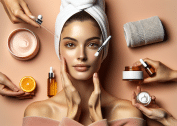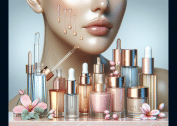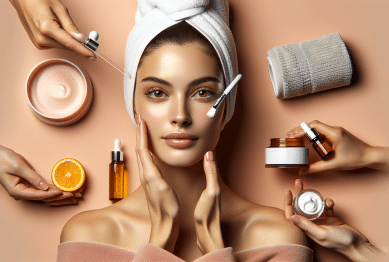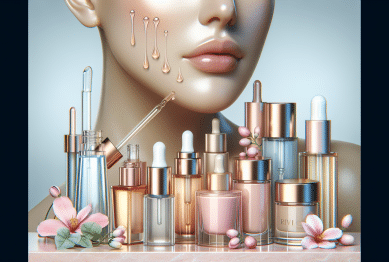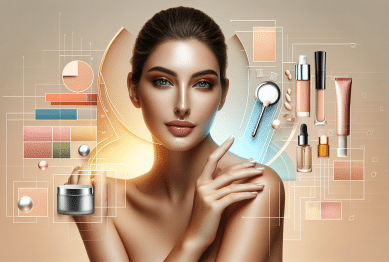Discover how daily routines can bring out the healthiest version of your skin. This guide uncovers approachable, effective skincare strategies, explores trending wellness routines, and reveals surprising beauty tips—all aimed at helping you unlock a refreshed look and boost your self-confidence with evidence-backed habits.
Why Everyday Skincare Matters More Than You Think
Many underestimate the impact that simple daily habits have on the skin’s appearance and long-term health. Routine care doesn’t need to involve expensive creams or complicated treatments to make a noticeable difference. In fact, consistency with cleansing, moisturizing, and sun protection forms the backbone of any effective skincare regimen. The skin is our body’s largest organ. Treating it with daily respect—like gentle cleansing—can prevent premature aging, irritation, and environmental damage. Even a short ritual each morning and evening sets a strong foundation for a glowing complexion, helping you look your best and feel confident in your own skin.
Research shows the relationship between skincare routines and skin health goes well beyond surface appearance. People who maintain a simple, regular practice—like cleansing away pollutants or sweat—support their skin’s natural barrier. This in turn locks in hydration and blocks out irritants. Skincare experts note that gentle attention daily isn’t just about aesthetics; it can have benefits for those with acne, dryness, or sensitive skin, promoting resilience and comfort. A mindful daily ritual also encourages self-care, setting a positive tone for your mental well-being and stress management throughout the day.
For many, a barrier to starting an effective daily skincare routine is feeling overwhelmed by all the advice out there. But the science supports that habit, not product cost or complexity, is the real influencer. Focusing on a few evidence-backed steps—consistent hydration, mild cleansing, and sun protection—can yield real changes over time. Simple doesn’t mean ineffective. Over time, many experience brighter, smoother, and more comfortable skin that better withstands aging and everyday stress. Small steps, repeated daily, lead to lasting transformations.
The Power of Cleansing for Radiant Skin
Perhaps the most critical step in any beauty or wellness routine is effective cleansing. Our skin faces daily exposure to pollution, environmental toxins, sweat, and even makeup residue—all of which can clog pores and lead to inflammation or breakouts. Experts recommend using a gentle, pH-balanced cleanser that removes impurities without damaging the skin’s natural oils. Over-cleaning or using harsh surfactants can cause dryness, redness, or even increase oiliness as skin tries to compensate. Balancing your cleansing frequency and choosing the right formula sets the stage for healthy, glowing skin while minimizing common irritants.
Nighttime cleansing is especially important to remove sunscreen, makeup, and built-up daily grime. Evidence suggests that leaving these particles on the skin can accelerate signs of aging. The skin naturally repairs and regenerates overnight. By starting with a fresh, clean canvas, you give your skin the chance to maximize its own natural renewal. Some dermatologists also highlight the benefits of lukewarm water; hot water can strip oils, whereas cool water may not fully lift debris. With regular, thoughtful cleansing, people often report smoother, more balanced skin and fewer breakouts.
For individuals with specific skin concerns, such as acne or sensitivity, selecting targeted cleansers can greatly impact outcomes. Non-comedogenic, fragrance-free formulas tend to be safest for most skin types. Double cleansing—a method using oil-based before water-based products—has gained popularity for its thorough yet gentle approach, particularly for people who wear heavy makeup or live in highly polluted environments. As cleansing habits improve, it’s common to see less congestion, increased brightness, and improved overall skin texture, supporting both wellness and beauty goals.
Hydration: The Secret to Comfortable Skin
Proper hydration is essential for both the appearance and function of the skin. Moisture helps maintain the protective barrier that seals in water and repels harmful microbes or allergens. When skin lacks moisture, it can look dull, flaky, or feel tight and itchy. Drinking enough water is a good baseline, but most experts agree that topical moisturizers play a key role—especially as weather, hormones, or age fluctuate. When you regularly moisturize after cleansing, your skin retains more elasticity and resilience, making it more resistant to premature aging and environmental stressors.
The right moisturizer depends on your skin type. Light gel lotions are favored by those with oily or acne-prone skin, while heavier creams benefit dry or mature skin. Ingredients such as hyaluronic acid or ceramides are well-studied for locking in hydration without clogging pores. Adopting this habit, especially immediately after bathing (when skin is most receptive), keeps the skin’s natural defenses robust. Hydrated skin also provides a smoother base for makeup application, reducing the appearance of fine lines or uneven patches.
Hydration isn’t just about moisturizers. Humidifiers, hydrating serums, and facial mists—when used appropriately—can enhance results, especially in dry indoor environments or harsh climates. Consider layering hydrating products, starting with lightest to heaviest, to maximize their effects. Over time, many people notice their skin appears plumper, more radiant, and better able to tolerate weather changes or stress. The act of moisturizing can also be a grounding moment for daily self-care, connecting inner wellness with outer beauty in a sustainable, skin-loving way.
Sun Protection: Your Shield Against Premature Aging
Consistent sun protection is one of the most meaningful ways to prevent early aging and protect against skin cancer. Ultraviolet (UV) rays are responsible for most visible signs of aging—wrinkles, loss of firmness, and uneven pigmentation. Dermatologists urge daily use of broad-spectrum sunscreen, regardless of the weather or skin tone. Protecting your skin from the sun’s rays supports not only a more even complexion but also long-term health, reducing your risk of sunburn and skin cancers, as supported by numerous studies and health organizations.
Application techniques matter. Most experts recommend using about a nickel-sized amount of sunscreen for the face and a shot-glass amount for the body, reapplying every two hours if outdoors. SPF 30 or higher is generally suggested for daily use. Additional measures—like seeking shade, wearing hats, or using UV-protective clothing—can provide extra peace of mind, especially during peak sunlight hours. Modern formulas have become more comfortable and versatile, with lightweight, non-greasy textures favored even by those with sensitive or oily skin.
The connection between sun exposure and skin aging is well-documented. Studies indicate that people who adopt diligent sun protection in their routines often see reduced formation of dark spots and wrinkles compared to those who skip this step. Beyond beauty, regular use of sunscreen is advised by organizations such as the American Academy of Dermatology and Skin Cancer Foundation for its role in maintaining the skin’s youthfulness and overall wellness. Protecting the skin daily safeguards your long-term appearance and health in a simple, accessible way.
Nutrition and Lifestyle for Lifelong Radiance
The relationship between nutrition, wellness, and beauty grows clearer each year. What’s consumed—fruits, vegetables, healthy fats, and antioxidants—directly influences the skin’s elasticity, vibrancy, and resilience to stress. Diets rich in vitamin C, omega-3 fatty acids, and polyphenols have been linked to smoother, younger-looking skin and fewer breakouts. Hydration through water-rich foods and minimizing processed snacks or sugary drinks contribute to these positive effects. Holistic beauty begins on the inside, shaping how skin appears on the outside.
Lifestyle habits such as sleep, movement, and stress management also impact the way your skin looks and feels. Chronic stress can raise inflammation, disrupt hormonal balance, and trigger breakouts or flare-ups of conditions like eczema or psoriasis. Getting enough restorative sleep allows the skin time to rejuvenate and repair, with research showing visible improvements in clarity and texture among well-rested individuals. Regular movement boosts circulation, delivering nutrients to the skin and promoting a healthy, rosy glow. Wellness isn’t just a practice—it’s a lifestyle that supports skin from every angle.
Limiting alcohol, quitting smoking, and balancing work with downtime all feed into a rewarding cycle of wellness and beauty. Each choice either supports or undermines the skin’s natural ability to thrive. For those exploring targeted supplements or wellness trends, expert guidance is important, as some ingredients have proven benefits while others lack support. Ultimately, lasting change often starts small: one glass of water, one extra hour of sleep, or one fresh vegetable at a time can lead to visible, sustainable improvements in how skin looks and feels.
Trending Skincare Ingredients and Their True Impact
With new beauty products launching frequently, it’s easy to get swept up in promises of miracle ingredients. However, science-backed evidence is crucial for separating fact from marketing hype. Ingredients like retinol, vitamin C, peptides, and niacinamide frequently appear in discussions about effective skincare, and dermatologists often cite their proven results—from reducing the appearance of wrinkles to evening skin tone. Studies confirm these actives can bring about real improvements when integrated carefully and consistently into a person’s daily routine.
It’s tempting to try every new trend at once, but overloading the skin with active ingredients can sometimes do more harm than good. Experts suggest introducing one new product at a time and monitoring for signs of irritation or improvement. Patch testing is especially important for those prone to sensitivities. Not every trending ingredient is right for every skin type. Personalized routines, guided by scientific findings and professional advice, offer the biggest benefits and help you avoid unnecessary irritation or costly mistakes.
Beyond actives, gentle daily habits remain the cornerstone of beautiful, resilient skin. Natural oils, botanical extracts, and probiotics are also receiving attention for their ability to soothe, nourish, and balance the skin barrier. Integrating evidence-based products into a solid routine can help address individual concerns like redness, uneven pigmentation, or loss of firmness. In the world of beauty, lasting results come from a consistent partnership between trending innovations and time-tested daily self-care practices.
References
1. American Academy of Dermatology Association. (n.d.). Skin care: How to maintain healthy skin. Retrieved from https://www.aad.org/public/everyday-care/skin-care-basics/care
2. Skin Cancer Foundation. (n.d.). Prevention guidelines. Retrieved from https://www.skincancer.org/skin-cancer-prevention/
3. Harvard Health Publishing. (n.d.). Skin care: 5 tips for healthy skin. Retrieved from https://www.health.harvard.edu/staying-healthy/skin-care-5-tips-for-healthy-skin
4. National Institutes of Health. (n.d.). Nutrition and skin health. Retrieved from https://www.niams.nih.gov/health-topics/nutrition-skin-health
5. Mayo Clinic. (n.d.). Skin care routine: Tips for healthy skin. Retrieved from https://www.mayoclinic.org/healthy-lifestyle/adult-health/in-depth/skin-care/art-20048237
6. Cleveland Clinic. (n.d.). Sunscreen: How to help protect your skin. Retrieved from https://health.clevelandclinic.org/how-to-choose-sunscreen


